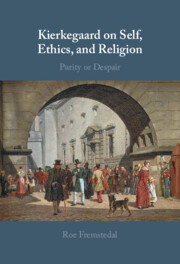Book contents
- Kierkegaard on Self, Ethics, and Religion
- Kierkegaard on Self, Ethics, and Religion
- Copyright page
- Dedication
- Contents
- Figures and Tables
- Acknowledgments
- Abbreviations
- Introduction
- Part I Self, Despair, and Wholeheartedness
- Part II Morality, Prudence, and Religion
- Part III “Subjectivity, Inwardness, Is Truth”
- Chapter 8 “Hidden Inwardness” and Humor: Kantian Ethics and Religion
- Chapter 9 Subjective Truth: “Kierkegaard’s Most Notorious … Claim”
- Part IV Faith and Reason
- References
- Index
Chapter 9 - Subjective Truth: “Kierkegaard’s Most Notorious … Claim”
from Part III - “Subjectivity, Inwardness, Is Truth”
Published online by Cambridge University Press: 27 January 2022
- Kierkegaard on Self, Ethics, and Religion
- Kierkegaard on Self, Ethics, and Religion
- Copyright page
- Dedication
- Contents
- Figures and Tables
- Acknowledgments
- Abbreviations
- Introduction
- Part I Self, Despair, and Wholeheartedness
- Part II Morality, Prudence, and Religion
- Part III “Subjectivity, Inwardness, Is Truth”
- Chapter 8 “Hidden Inwardness” and Humor: Kantian Ethics and Religion
- Chapter 9 Subjective Truth: “Kierkegaard’s Most Notorious … Claim”
- Part IV Faith and Reason
- References
- Index
Summary
Chapter 9 examines different readings of the notorious thesis that “subjectivity, inwardness, is truth” in Concluding Unscientific Postscript. It is argued that, instead of involving objectionable subjectivism, subjective truth involves an original, adverbial theory of truth that is relatively unexplored. Specifically, subjective truth concerns living truly by being wholehearted (as suggested by Daniel Watts). In addition, it is closely associated with subjective, practical justifications of religious belief found in pragmatism (practical nonevidentialism) concerning religious belief. However, these subjective justifications of belief need not involve subjectivism or fideism, since belief could be supported by practical reasons that are objective by holding even if they are not subjectively recognized. Indeed, Concluding Unscientific Postscript seems to presuppose objective truth and some form of metaphysical and metaethical realism. For Kierkegaard, there are objective, formal constraints on selfhood that prevent relativism and subjectivism. Specifically, wholehearted selfhood, which is to be true to oneself, requires full moral commitment and faith, hope, and charity.
- Type
- Chapter
- Information
- Kierkegaard on Self, Ethics, and ReligionPurity or Despair, pp. 158 - 170Publisher: Cambridge University PressPrint publication year: 2022



